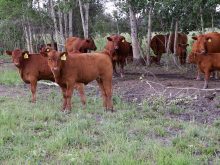Canadian breeding sheep and goats are still restricted from the United States, seven years after BSE closed the border to ruminant animals, because Canada has an inadequate scrapie surveillance program.
Wyoming state veterinarian Jim Logan told the Pacific Northwest Economic Region (PNWER) summit in Calgary July 19 that Canada needs to develop a producer driven eradication program so the border can be reopened.
The PNWER is a partnership of state and provincial governments and businesses representing British Columbia, Alberta, Yukon, Alaska, Idaho, Montana, Oregon and Washington.
Read Also

Trade war may create Canadian economic opportunities
Canada’s current tariff woes could open chances for long-term economic growth and a stronger Canadian economy, consultant says — It’s happened before.
“We do share some frustrations and we do want to see the border get open,” said Logan, who is also chair of the national animal health committee on scrapie.
“What I don’t want to see happen is for scrapie, like we’ve seen with brucellosis and others, turn into a political disease. But when you deal with regulatory affairs, the politics do enter into it.”
The U.S. Department of Agriculture must write a specific regulation to allow sheep and goats back into the country, similar to what was provided for cattle and bison.
The U.S. requires exporting countries to have the same ongoing surveillance, prevention and eradication programs as it does because it does not want to import potentially infected livestock.
Scrapie is a transmissible spongiform encephalopathy that is not passed to humans but can be a fatal neurological condition for sheep and goats. The U.S. has spent almost $18 million a year since 2003 to eradicate scrapie.
———
APPOINTMENT NOTICEJair Garcia,Division Director,Pfizer Animal Health Canada
Pfizer Canada is pleased to announce the appointment of Jair Garcia, DVM to Division Director, Animal Health Canada, following the recent worldwide integration of Wyeth with Pfizer Inc.
With more than 15 years of experience in the animal health industry, Dr. Garcia was most recently the Regional Director Latin America for Wyeth –Fort Dodge Animal Health. Over the course of his career with Wyeth he has held several positions of increasing responsibility both in Brazil and in the US as Business Manager Latin America and then Regional Director Latin America responsible for Argentina, Colombia and Venezuela Profit Centers.
He holds a degree in Veterinary Medicine (DVM) from Sao Paulo State University in Brazil.
Pfizer Animal Health is a world leader in discovering and developing animal vaccines and prescription medicines, investing an estimated US $300 million annually. In addition to helping assure a safe, global food supply from healthy food animals, Pfizer Animal Health also helps dogs, cats and horses to live healthy longer.















